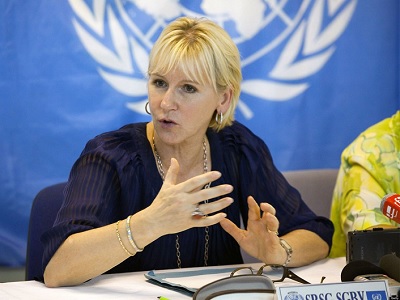
By Daud Abdullah
Diplomatic spats between Sweden and Israel have become a regular occurrence. Ever since the Scandinavian country recognised the state of Palestine in October 2014 relations between Stockholm and Tel Aviv have gone from bad to worse. At the heart of this stand-off is Sweden’s determination to pursue an independent foreign policy without diktats from any quarters, including Israel.
The latest episode in this long-running row has come in the wake of a remark made by Swedish Foreign Minister Margot Wallström during a parliamentary meeting. Responding to an allegation that her government favours the Palestinians, Wallström said that while Israel always has the right to defend itself, its response cannot be “extrajudicial executions” or become “disproportionate”.
On the face of it this assertion may seem normal and reasonable to any fair-minded observer. However, to Israel’s Prime Minister Benyamin Netanyahu it is scandalous and totally unacceptable. Not surprisingly, though, his telephone call to his Swedish counterpart, Prime Minister Stefan Löfven, failed to win an apology. In fact Löfven added fuel to the fire when he told a local news agency that knife attacks in Israel fail to meet the internationally accepted definition of a terror attack.
“There is an international classification regarding what constitutes or does not constitute [terror]. As far as I know, the [knife attacks in Israel] are not defined as terror,” he said.
Later that same day (Monday), Löfven further explained to the agency that it is not clear whether the knife attacks in the West Bank and Jerusalem were organised by a classified terrorist organisation though “organised attacks are precisely acts of terrorism.”
Underlying the tensions is the fact that Sweden as a sovereign state wants to determine its own foreign policy, without having to grovel to, or blindly follow a given line especially when it is not based on internationally recognised standards. This, in fact, is the same approach adopted earlier this year when Foreign Minister Wallström criticised Saudi Arabia’s human rights record, notably with regard to women. After refusing to retract her statements, Saudi Arabia blocked the Swedish foreign minister from giving a speech to the Arab League in March.
In this instance, Israel is clearly disturbed for two reasons. First, that Sweden’s defiance may resonate elsewhere in Europe and encourage other countries to similarly challenge and condemn Israel’s culture of impunity in the occupied territories. Neighbouring Scandinavian countries are perhaps the most likely candidates to follow suit since they do not have the historical baggage that have deterred countries such as Germany, Britain and France from taking a strong stand against Israeli violations of international law.
Of course it is not just Israel’s apparent shoot-to-kill policy that has provoked criticism from Sweden’s foreign minister. The maltreatment of Palestinian women by the occupation forces has also been especially toxic to Wallström who promised a feminist foreign policy when she took office. She must now be appalled by this week’s jailing of the left-wing female Palestinian parliamentarian, Khalida Jarar, on trumped up charges.
Ultimately, the growing disquiet across Europe over Israel’s human rights record and alleged crimes against humanity will rest heavy on the consciences of many officials and serve as a constant reminder of their duty to bring those responsible to account. The unwillingness of the EU to back down over the question of Israel’s illegal settlements and the labelling of its produce is a clear sign that patience with Israel is wearing thin. Hence it is no wonder that Israel has moved to suspend discussion of its conflict with the Palestinians with EU officials.
Thus far, Tel Aviv’s bully tactics and intimidation seem wholly ineffective and futile. In the case of Sweden it is clearly not a banana republic that can be dictated to and pushed over by Israel. Since the 1970s Israel has meddled in the affairs of weak and unstable countries in Central and South America. In Colombia it has provided training for paramilitary forces, including the militias of narcotics cartels. That role continues today with Israeli involvement in Mexico, Honduras and the Dominican Republic. This type of interfering, diplomatically or otherwise, will not succeed in Europe.
Netanyahu’s attempts to smear Foreign Minister Wallström with claims that she did not condemn the attacks in San Bernardino, California or Paris as she did with Israeli policies in the occupied territories, are patently disingenuous. It fits, after all, with his usual methods of emotional blackmail. If Sweden can resist such tactics others in Europe surely can.
– Dr. Daud Abdullah is the director of the Middle East Monitor (MEMO) in London. (This article was first published in Middle East Monitor.)





Israel an entity is crazy to the core, and totally unpopular with sensible states. Using its Big Mouth and pointing fingers at others is morbid.